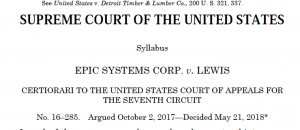Unpaid wage and overtime lawsuits are often brought as class actions or collective actions. This way, many employees can band together and use the power of numbers to take on powerful corporations. But, on May 21, 2018, The U.S. Supreme Court practically slammed its doors directly in employees’ faces while providing an easy escape route for employer’s to violate workers’ rights.
Because lawsuits can be time consuming and costly, many employers require their employees to sign arbitration agreements. Arbitration agreements require employees to use private arbitration to litigate workplace disputes. Further, these agreements sometimes require that employees may only start an arbitration on an individual basis, not a class wide basis.
The issue in Epic Systems Corp. v. Lewis, was whether arbitration provisions allowing class and collective actions to be waived, were enforceable. Starting in 2012, the National Labor Relations Board (“NLRB”) decided on multiple occasions that class action waivers incorporated in arbitration agreements violated the National Labor Relations Act (“NLRA”) because it prevented employees from engaging in certain actions which are explicitly allowed under Section 7 of the NLRA.
Specifically, Section 7 grants employees the right “to bargain collectively through representation of their own choosing and to engage in other concerted activities for the purpose of collective bargaining or other mutual protection.”
In a 5-4 decision, the U.S. Supreme Court disagreed with the NLRB’s decisions and held that class action waivers are enforceable. The Epic decision, gave employers the green flag to not only include these waivers, but also force employees to sign them. Signing this agreement, however, provides employers with a substantial amount of power while resulting in a harsh blow to the workers’ rights.
Justice Neil Gorsuch wrote the majority decision in Epic and held that the NLRA does not overrule the federal arbitration law. Accordingly, the court decided that these arbitration agreements are enforceable.
Recently, after seeing a rise in certain workplace related claims, employers have started to demand that workers sign arbitration agreements and forfeit their rights to file claims through court or with other employee’s as a class in arbitration even when other employee’s suffered a similar injury. Thus, the only option left for employee’s who have entered into these agreements is to proceed individually in an arbitration proceeding.
The addition of this clause is a strategic move for employer’s because it tends to dissuade employees, from filing a claim, especially those who may not have a substantial amount of damages, because employment attorneys may be reluctant to the case.
Although proceeding through arbitration has certain benefits including being a faster and cheaper alternative to litigation, it does not provide employees with the proper tools necessary to ensure a resolution that will likely be in the employee’s best interest.
Indeed, Justice Ginsburg’s powerful dissent stated that the decision was going to result in the “under enforcement of federal and state statutes designed to advance the well-being of vulnerable workers.” Notably, she pointed out the importance of there being strength in numbers and mentioned that the Court’s decision in preventing employees from joining together to fight for better terms and conditions of employment leaves employees “disarmed in dealing with an employer.” Overall, she characterized the Epic decision as “egregiously wrong” and a “destructive result.”
In sum, the Supreme Court’s pro-employer decision has kicked employee rights to the side while allowing employers to escape liability. In light of the #MeToo movement, the effect of the Court’s decision in Epic is going to likely silence a number of sexual harassment victims who through this movement, recently started to gain the strength to come forward. This decision has only silenced employees’ rights leaving an already vulnerable class to fend for themselves.
Due to the lasting implications this decision will have on workers, it is crucial that employees meticulously review any type of agreement before agreeing to sign. Otherwise, the fine print may trick an employee and he or she may inadvertently make an irreversible decision.
The Long Island employment lawyers at Famighetti & Weinick, PLLC are experienced in reviewing employment agreements. If you have any questions about your employment agreement or about arbitration, contact a Long Island employment lawyer at Famighetti & Weinick at 631-352-0050. Our website is https://www.linycemploymentlaw.com/.
Today’s Long Island employment law blog was written by law clerk Thalia Olaya.
 Long Island Employment Law Blog
Long Island Employment Law Blog


